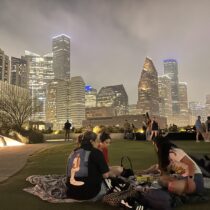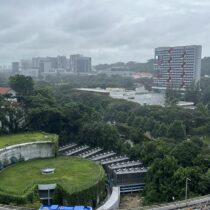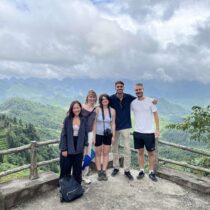A Walk on the Beach
July 20, 2023A few days ago, we celebrated our thirtieth wedding anniversary while on ETH secondment to Singapore. This unique opportunity gave us the perfect excuse for a short escape from the megacity, which we hoped to find a boat ride away at a small, sustainably managed island resort (ecologically conscious as we are, of course). And indeed, a few hours later we arrived on a small speck of land in the seemingly endless turquoise sea, with gorgeous bamboo guest houses, palm trees, white sandy beaches, crystal clear water, exotic wildlife and the tropical ocean breeze playing in our hair. Ahh, paradise!

Or so we thought. After not even 10 minutes on the beach, we had collected a sizable amount of all kinds of plastic items, ranging from small chips of Styrofoam to children’s toys, innumerable plastic bottles and containers (including lab vials!), and straws, straws, straws. A century of waste from our oh-so civilized modern world. Approximately five collection walks later, each time returning with a fully filled bag, we decided then and there to stop buying – as far as possible – “disposable” items made from plastic, including lighters, cups, bottles, bags, string, straws, ballpoint pens and other office items, and to avoid “single use” plastic whenever possible (this specifically will be a challenge living in Singapore). The phrase “think globally, act locally” came to mind again. Consumer sovereignty.
Has this decision eased our conscience? Will it make a difference? Possibly a teeny-tiny bit. Most of all, it feels like a relief. We don’t really need this stuff anyway. After all, it’s a matter of changing one’s mindset and adjusting one’s habits and behavior accordingly. Less is more.

Strolling through this tropical world, we found an incredibly rich abundance of life, including hatching sea turtles (well-guarded by local wildlife rangers), numerous animals, and plants we had never seen before. It made us realise once again that we don’t know what we don’t know, and we cannot value what we don’t know. Scientific research helps us map, understand and protect life on our planet. The various environmental DNA (eDNA) collections that are currently ongoing worldwide enable noninvasive sampling of genetic information from a small probe of seawater, air, soil and other sources. These activities include a UNESCO initiative to collect eDNA across marine world heritage sites and study biodiversity of underwater life. With a similar goal in mind, we hosted the phenomenal ETH’s BiodivX Team at the Singapore-ETH Centre a few weeks ago for the semi-finals of the XPRIZE Rainforest competition for biodiversity assessment and enhancing our understanding of rainforest ecosystems.
Science will help us meet the environmental challenges of our time. The Singapore-ETH Centre develops sustainable solutions to global challenges in Singapore, Switzerland and the surrounding regions. The Centre offers unique opportunities for future-oriented research and connecting with amazing Southeast Asia. We’re ETH Ambassadors.






